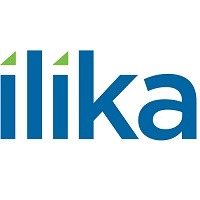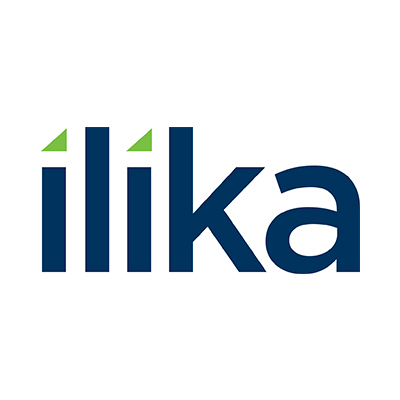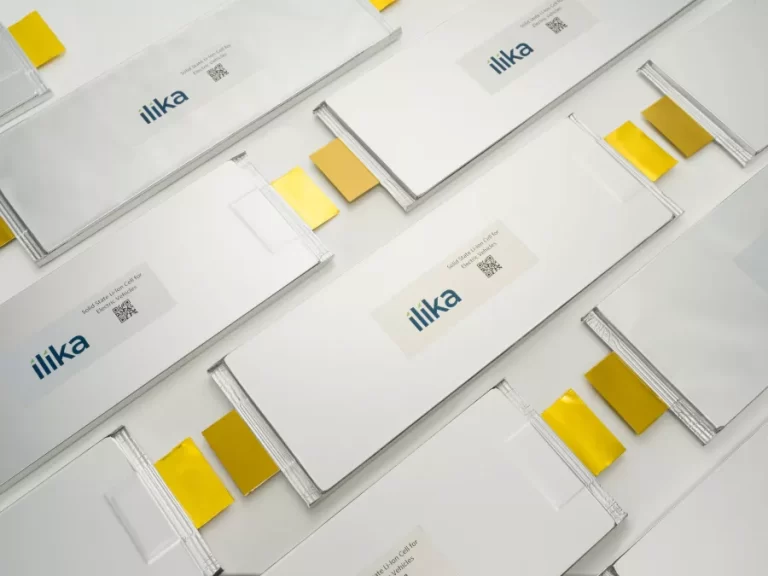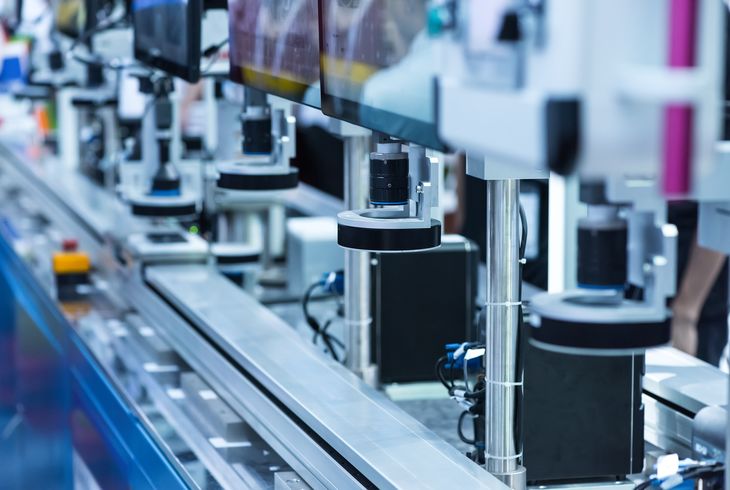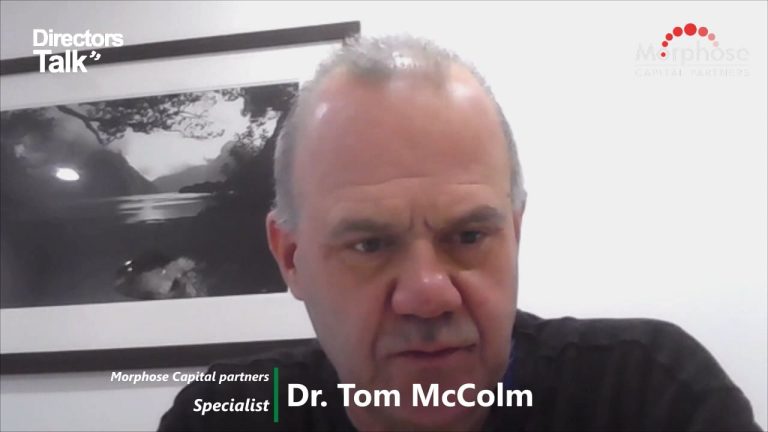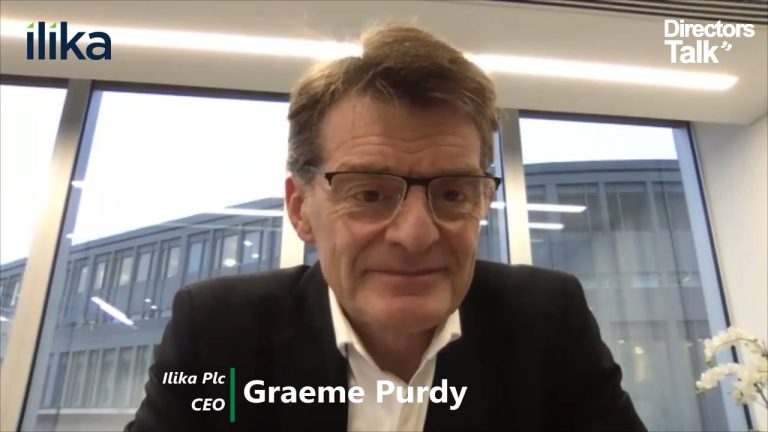Ilika plc (LON: IKA) a pioneer in solid-state battery technology, announced today its full-year results for the year ended 30 April 2019.
Operational highlights:
· Implementation of Stereax® development programmes with five commercial partners:
- Combining with Lightricity photovoltaic technology for high-value asset tagging
- Deploying with Titan Wind Energy, in condition monitoring devices for wind turbines
- Developing and deploying track monitoring devices with Network Rail
- Demonstrating an autonomous smart sensor card for environmental sensing.
- Developing batteries for miniature medical implants with a leading bioelectronics company
· Stereax® achieving significant technical development milestones with:
o Record energy density from ultra-thin cells for medical implants
o Development of photolithographic method to produce custom cells compatible with semiconductor manufacturing processes
o Launch of M50 cells, mm-scale new product for MedTech
o Demonstration of ability of P180 to withstand rapid ramps to high temperatures for industrial applications
· Establishing a Stereax® manufacturing collaboration with Semefab to enable lower cost industrial production.
· Commencing Goliath large format cell programme:
o Securing £4.2m of granting funding from the Faraday Battery Challenge to develop large format solid-state cells for automotive applications
o Commencing the PowerDrive Line collaboration with Honda and Ricardo to develop rapidly charging batteries
o Starting the MoSESS collaboration led by McLaren Automotive to power high-performance vehicles.
· Appointment of Keith Jackson as Chairman and Dr. Monika Biddulph and Jeremy Millard as Non-Executive Directors
Financial highlights:
· Turnover up 26% to £2.6m (2018: £2.1m)
· Loss after tax for the year £2.3m (2018: £2.9m)
· Loss per share 2.4p (2018: 3.7p)
· Cash, cash equivalents and bank deposits of £4.0m (2018: £2.8m)
· Raised c.£4.1m at a price of 20 pence per share in July 2018
Commenting on the results Ilika plc’s Chairman, Keith Jackson, said:
“This year has seen Ilika exploiting its technical know how to establish a multi-million pound programme for automotive traction batteries, supported by the UK Faraday Battery Challenge funding stream, to enable green transportation. Additionally, Ilika’s micro battery technology has now reached record levels of energy density for perpetual, fit and forget, power which cannot be addressed by existing cell technology. Along with its prototype and pilot manufacturing line Ilika is forming partnerships to scale battery manufacture for industrialisation. The growth in Ilika’s research and development project funding is reflected in nearly 30% turnover growth and stronger than expected year end cash balance. This strong technical and commercial progress forms a solid foundation for continued progress in the coming year.”
STRATEGIC REPORT
The Directors present their Strategic Report for the year ended 30th April 2019.
Principal Activities
Ilika plc is the holding company for Ilika Technologies Limited, a pioneer in solid-state battery technology. Ilika has developed ground-breaking solid-state battery technology (Stereax®). The Stereax® roadmap commenced with miniature batteries designed to meet the demands of powering wireless devices, referred to as “the Internet of Things (IoT)” and has been extended to include large format cells for automotive.
Business Strategy
The Company’s mission is to have its Stereax® solid-state batteries integrated into market-leading products sold by leading commercialisation partners around the world. Initially targeting premium niche markets, the Company expects these end-products to fit into or create end-markets worth in excess of $1 billion per year, in which the Directors believe a number of the Company’s commercialisation partners are positioned to have a leading share.
The Company’s revenue model involves three phases of activity: a) commercially-funded and grant-funded development projects; b) IP licensing; c) receipt of royalties when products incorporating Ilika IP reach market. Ilika is currently in the first phase of activity, with its revenue being generated from a portfolio of development programmes. The Company has built a pipeline of licensing opportunities to support the start of its second phase of revenue generation.
Operating Review
Solid-State Batteries
Ilika has been working with solid-state battery technology since 2008 and has developed a type of lithium-ion battery, which, instead of using liquid or polymer electrolyte, uses a ceramic ion conductor.
Ilika’s solid-state batteries have a number of benefits over lithium-ion batteries, including the following:
· Non-flammable
· 6x faster to charge
· 2x energy density on a weight basis
· 10x longer storage without loss of charge
Relative to other miniature batteries, Ilika Stereax® batteries use patented materials and processes enabling superior energy density per battery footprint, up to 40% improvement on other solid-state solutions. Ilika’s batteries do not contain any free lithium metal which makes them more moisture resistant. Additionally, solid-state batteries are expected to be easier to recycle because, unlike conventional batteries, they do not contain any toxic liquids.
Stereax® Technology Roadmap
Ilika elected to focus its initial cell development on miniature devices suitable for powering sensors, sometimes called IoT end-nodes, due to the size of the opportunity and speed to market. There are already up to 15 billion sensors on the planet and most of them are currently either hard-wired or powered by disposable coin cells. Hard-wired sensors are expensive to install because of the cost of cabling, but thereafter they have low maintenance costs. Sensors powered by disposable batteries are relatively cheap to install, but expensive to maintain because of the cost of the maintenance crews deployed to replace and dispose of the batteries at regular intervals. Ilika’s miniature devices are designed to be combined with a small energy harvester (usually photovoltaic) to allow them to be recharged and therefore to operate for an extended period of time, usually up to ten years. This concept is designed to offer a low cost of installation compared to hard-wired devices combined with lower maintenance costs relative to using disposable coin cells.
Wireless IoT devices offer a different set of battery challenges compared to other electronic devices. They have similar pressures, such as cost and availability, but they also have some specific requirements, depending on the environment in which they are deployed:
o Small size in both footprint and thickness
o Ability to be trickle charged
o Charged only when an energy harvester can get energy
o Longer life span to match those of sensors and microcontrollers
o Support wider temperature ranges
Battery Product Launches
Building on its existing Stereax® M250 and P180 solid state battery IP offerings, Ilika launched its mm-scale M50 for MedTech this year.
The Stereax® M250 operates in a temperature range to over 100°C, 30°C higher than other solid-state products. The Stereax® P180 has the additional benefit of supporting a temperature up to +150°C. This higher temperature is required for many Industrial IoT and Automotive end applications enabling always on, self-charging energy efficient sensor solutions for more demanding environments. As the trend towards digitising industrial processes gathers momentum there is a growing requirement for components with enhanced tolerance to temperature, moisture and vibration. The M50 has been produced using a photolithographic process which is compatible with semi-conductor manufacturing processes. It also allows Ilika to produce custom size batteries, formed in a variety of sizes, from a single production wafer. The process also has the advantage over contact masks of being able to create smaller feature sizes of less than a micron. Examples of MedTech devices which can benefit from Stereax battery technology are cardiac devices, blood pressure monitors, neurostimulators, gastric stimulators, smart contact lenses and smart dental braces.
Battery products under development
The Ilika Stereax® roadmap focuses on three main areas:
· Miniaturisation. This looks at mm-scale batteries for small sensor-driven devices, making them ideal for medical devices.
· Capacity. For the launch of both the M250 and the P180, Ilika designed and made wireless sensor nodes measuring temperature, humidity and light intensity. The power requirements of sensors do vary, depending on the nature of the sensor. For example, a motion detector has a higher power requirement than a temperature sensor. In order to be able to power a wider range of devices, Ilika is increasing the energy capacity of its batteries. Sensors are typically deployed in difficult to access locations where the long life of the device is paramount for a low total cost of ownership.
· Large format. Solid-state batteries are of great interest to the automotive industry because a change in battery capability is needed to make electric transportation an everyday reality. Ilika first started working on solid-state materials through its collaboration with Toyota in 2008. Many automotive companies now have solid-state cells on their electric vehicle roadmap and Ilika has responded to the rising number of inbound enquiries by commencing its large format cell development programme. This topic is discussed further below.
Stereax Development and Deployment Projects
Ilika secured two additional OEM partners during the period, building on three ongoing development and deployment programmes with global OEM’s.
Integrated energy harvester and battery
In December 2016, the company commenced a collaborative project with Sharp Laboratories of Europe (now known as Lightricity) to create an autonomous energy harvesting power source which involves combining Ilika’s battery with Lightricity’s photovoltaic (PV) technology to create a compact, self-recharging power pack. This integration project is aligned with the development track for increasing the capacity of Stereax batteries. Beta prototype samples have been shared with commercialisation partners for evaluation.
Miniature medical implant
In March 2017, the company announced a collaborative project with a well-financed bioelectronics company to develop a battery for miniature medical implants to provide treatments for serious health conditions, through the body’s own nervous system. The programme is supported by Innovate UK and the Medical Research Council.
Wind turbine condition monitoring
In November 2017, Ilika announced a partnership to deploy Stereax powered devices for the condition monitoring of wind turbines with Titan Wind Energy, the largest manufacturer of wind turbines in China and the 4th largest globally. Beta prototype devices are nearing readiness for trial deployment.
Environmental sensing
In January 2019, Ilika entered into a demonstration project to deploy its Stereax batteries to power an autonomous wireless sensor for environmental sensing and asset tracking.
Rail track condition monitoring
In March 2019, Ilika commenced a trial deployment of wireless sensors for monitoring rail infrastructure with Network Rail. In the initial deployment, sensors will measure track strain due to high temperatures. The ability of Ilika’s batteries to withstand temperatures of up to 150C makes them particularly suitable for deployment in the hostile trackside environment.
Innovate UK Faraday Battery Challenge
Innovate UK is expecting 50% of vehicle production by 2030 to be electric vehicles (EV) or plug-in hybrid vehicles (PHEV). In July 2017, the UK government announced a £246 million commitment over 4 years for automotive battery development, covering cell manufacture, modules, battery pack design and deployment in vehicles. In November 2017, this was followed with the announcement of an £80m National Battery Industrialisation Centre in Warwick. Innovate UK is administering a series of competitions, designed to promote battery innovation. In June 2018, Ilika announced that it had been offered £4.1m of grant funding to participate in collaborations with Honda, Ricardo, McLaren and A123 Batteries. Two projects are now underway.
The first, with Honda and Ricardo, is focused on the development of rapid charging battery packs. The second, with McLaren and A123 Batteries, is developing battery pack technology for high performance vehicles. The characteristics of Ilika’s solid state batteries are particularly suited to these use cases.
The development of large format cells uses a different process to micro batteries and Ilika is building a lower cost printing platform, suitable for printing bulk materials. Work is now well underway to establish a pre-pilot line close to its current facility in Southampton. This line will be commissioned in Summer 2019. It is anticipated that a second stage of scale-up to a pilot line could be achieved in collaboration with the National Battery Industrialization Centre. Ilika will validate its manufacturing processes on the pilot line so they can be licensed as proven to commercial partners, the same model as is used for Stereax.
Patent Position
Building Ilika’s intellectual property portfolio in solid-state batteries has continued to be a focus this year. Ilika believes its patents ring fence and protect critical IP to avoid competitors working around a single patent. Ilika now maintains a portfolio of 11 patent families in solid-state batteries, of which 3 are jointly owned with Toyota. This portfolio includes 15 granted patents.
Quality Management System
In December 2018, Ilika announced that the annual independent audit of its Quality Management System (QMS) was successful. ISO 9001 is the world’s most widely recognised QMS and helps organisations to meet the expectations and needs of their customers. The certification promotes the development of continual improvement, customer satisfaction, traceability and international best practices.
Key performance indicators (‘KPIs’)
The board monitors a small portfolio of KPI’s, which define the progress being made by the Group. The technical KPI’s benchmark battery development milestones and patent applications. Commercial KPI’s link the technical development programmes to the sales pipeline and engagement of commercialisation partners. Operational KPI’s ensure that overheads and cash resources are tightly controlled.
The most important financial KPIs are the cash position, turnover and profitability of the Group, which remain under constant focus and which are considered in the financial review.
FINANCIAL REVIEW
The Financial Review should be read in conjunction with the consolidated financial statements of the Company and Ilika Technologies Limited (together the ‘Group’) and the notes thereto. The consolidated financial statements are presented under International Financial Reporting Standards as adopted by the European Union. The financial statements of the Company continue to be prepared in accordance with International Financial Reporting Standards as adopted by the EU.
Statement of Comprehensive Income
Turnover
Turnover, all from continuing activities, for the year ended 30th April 2019 was £2.6m (2018: £2.1m). This includes £2.2m of grant income recognised from ten projects that the company has in progress with Innovate UK (2018: £1.3m from nine programmes). Details of the larger programmes are provided in the Deployment Projects above.
More of the Company’s activities are supported by grant or commercial funding than was the case in the prior year, with operational resources were more heavily devoted to the internally funded battery development programmes.
Administrative expenses and losses for the period
Administrative costs for the year were slightly decreased at £3.6m in 2019 relative to £3.8m in 2018. This excludes the share-based payment charge.
Combined cost of sales and administrative expenses were £5.0m in the year which is up from the £4.9m for 2018 and is associated with the increased direct costs as a result of the increased level of commercial and grant supported programmes.
The largest component of expenses is wages and salaries which remained level at £2.8m despite an increase from 40 to 44 staff.
752,546 Options lapsed in the year and 1,834,908 failed to vest due to market-related performance criteria. A charge of £162,461 has been included in the share based payment charge for the year in relation to the options that failed to vest.
The lower share-based payment charge together with the improved margin meant that loss on continuing activities before tax reduced from £3.3m in 2018 to £2.7m in 2019.
Statement of financial position and cash flows
At 30th April 2019, net assets amounted to £5.9m (2018: £3.8m), including net funds of £4.0m (2018: £2.8m).
The principal elements of the £1.2m increase over the year ended 30 April 2019 in net funds were:
· Funds raised in the year £4.1m from a Placing and Open Offer (2018: £nil)
· Operating cash outflow of £2.2m (2018: £2.6m);
· Increase in receivables of £0.5m (2018: decrease £0.1m) due to the higher number of grants underway at the year end
· Increase in payables of £0.4m (2018: decrease of £0.1m) due to purchases relating to the establishment of the solid state battery facility.
· R&D tax credits received of £0.3m (2018: £0.4m)
· Purchase of plant, property and equipment of £1.0m (2018: £0.3m) which mostly relates to the establishment of the large format solid state battery facility.
PRINCIPAL RISKS AND UNCERTAINTIES
Commercial risk
The Group is subject to competition from competitors who may develop more advanced and less expensive alternative technology platforms, both for existing materials and for those materials currently under development. The Group is largely dependent on its partners to commercialise the end-products containing the Group’s materials.
The Group seeks to reduce this risk by continually assessing competitive technologies and competitors. The Group seeks to commercialise its batteries and other materials through multiple channels to reduce overreliance on individual partners and, in agreements with partners, it ensures that there are commercialisation milestones which must be met for the partner to retain the rights to commercialise the intellectual property.
Financial risk
The Group is reliant on a small number of significant customers, partners and grant funding bodies. Termination of these agreements or grant polices could have a material adverse effect on the Group’s results or operations or financial condition. The Group expects to incur further operating losses as progress on development programmes continue.
The Group seeks to reduce this risk by broadening the number of customers and partners and thereby reduce reliance on individual significant companies and by leveraging it’s IP and resources over multiple projects. The Group applies for Research and Development tax credits to help mitigate its investment in these activities.
Intellectual property risk
The Group faces the risk that intellectual property rights necessary to exploit research and development efforts may not be adequately secured or defended. The Group’s intellectual property may also become obsolete before the products and services can be fully commercialised.
The Group reduces this risk by employing in-house staff with extensive global experience of patenting and licensing using commercially available patent searching and landscaping software. External patent agents and attorneys are used to advise on the drafting and filing of patent applications.
Dependence on senior management and key staff
Certain members of staff are considered vital to the successful development of the business. Failure to continue to attract and retain such highly skilled individuals could adversely affect operational results.
The Group seeks to reduce this risk by offering appropriate incentives to staff through competitive salary packages and participation in long-term share option schemes and a good working environment.
Brexit risk
The Group has reviewed the potential impact of Brexit on the risks identified above and believes that whilst intellectual property risk will remain largely unaffected, there may be an impact in the future regarding the Group’s ability to attract and retain highly skilled individuals.
The Group is alert to and continuously reviewing this potential risk and formulating its response at the appropriate time and no Brexit detriment has been incurred to date.
By order of the Board


